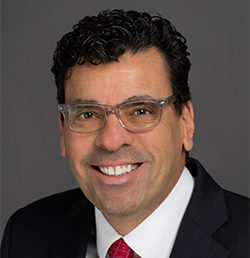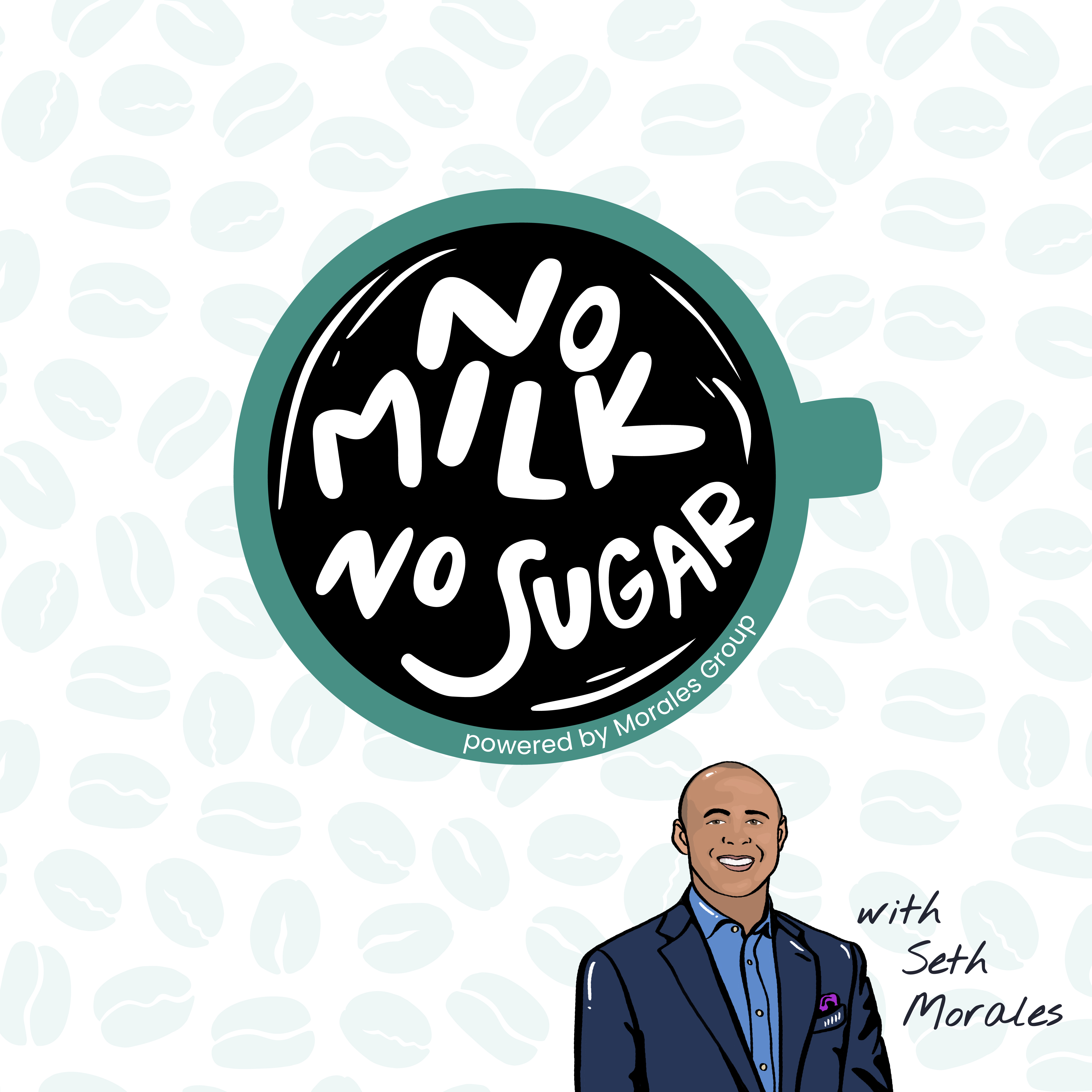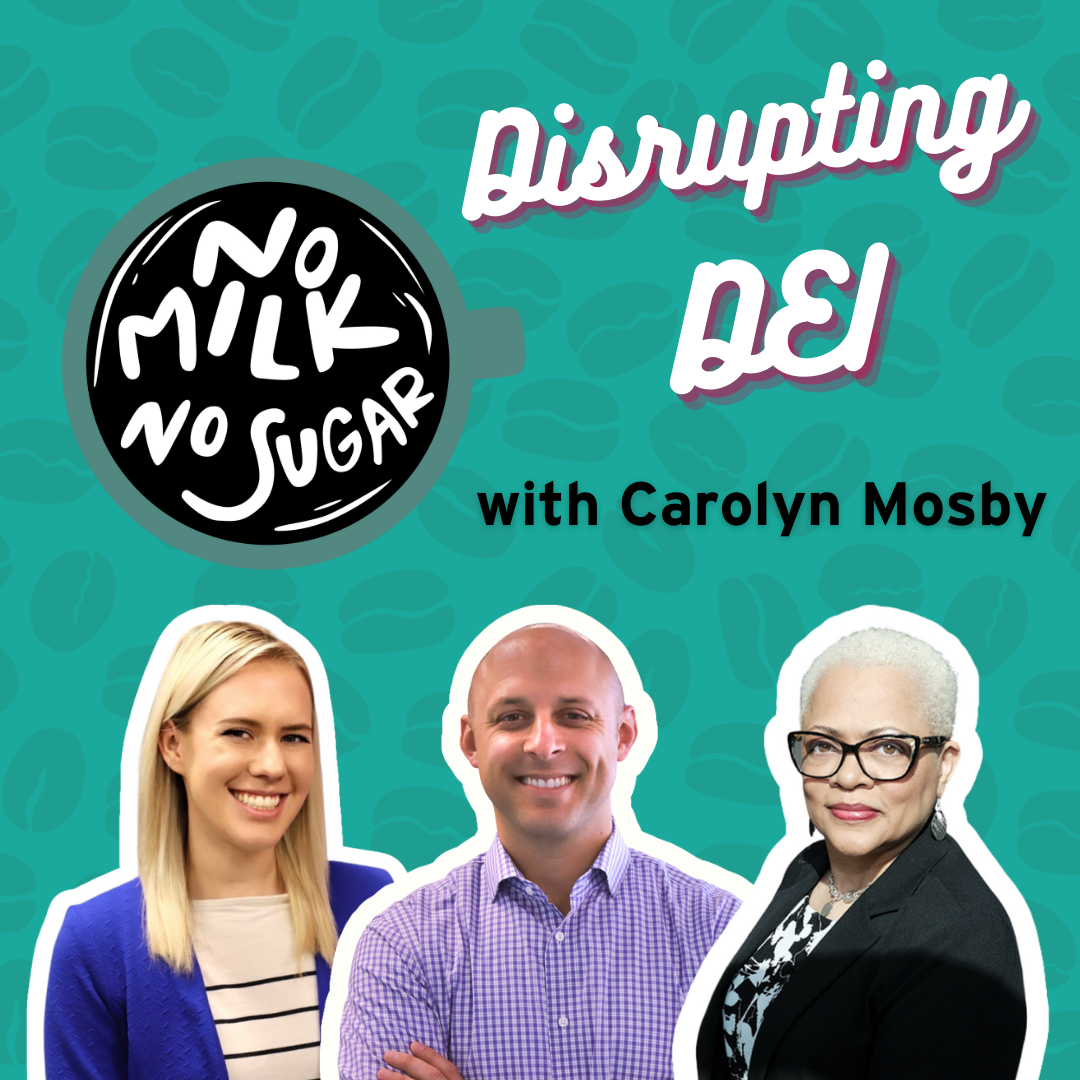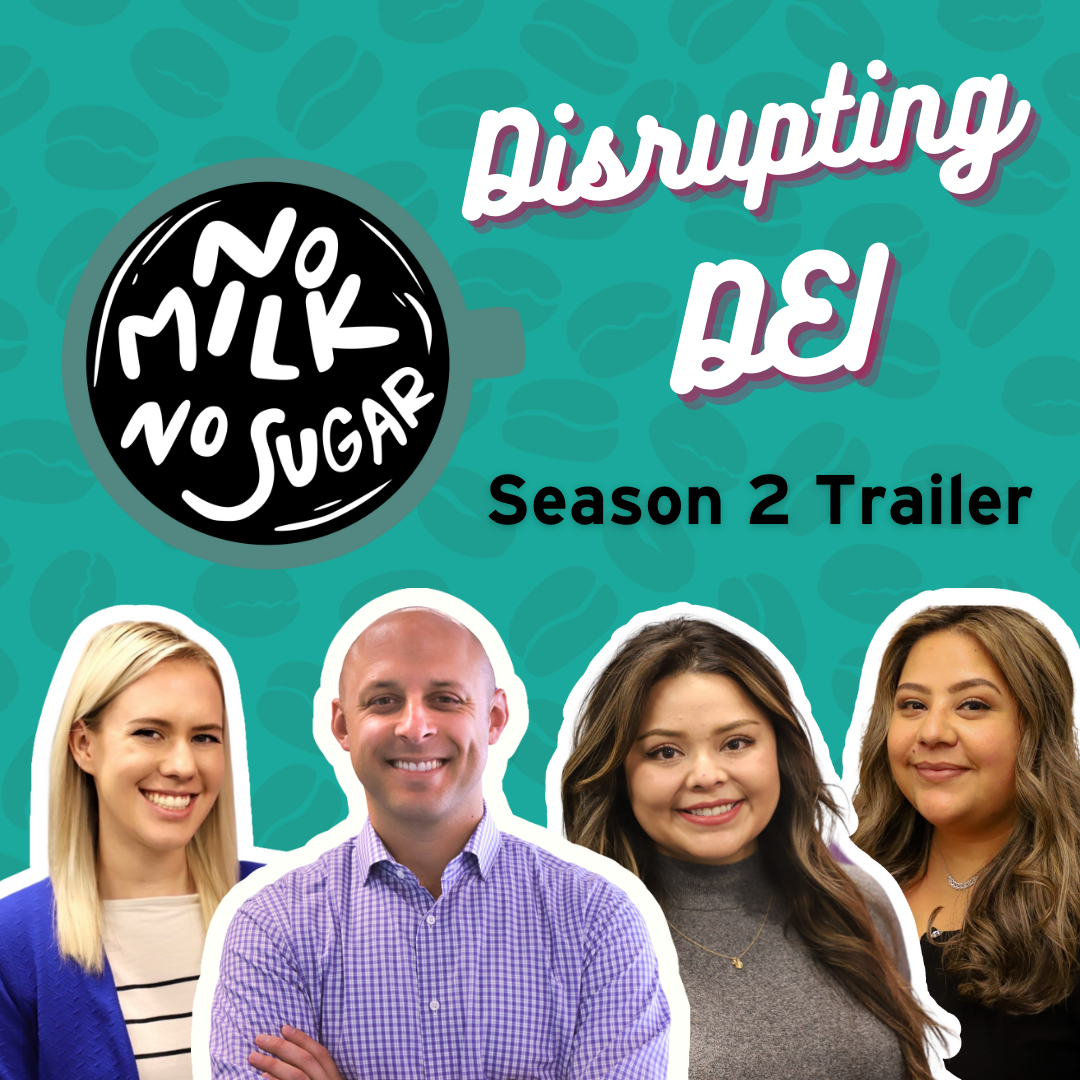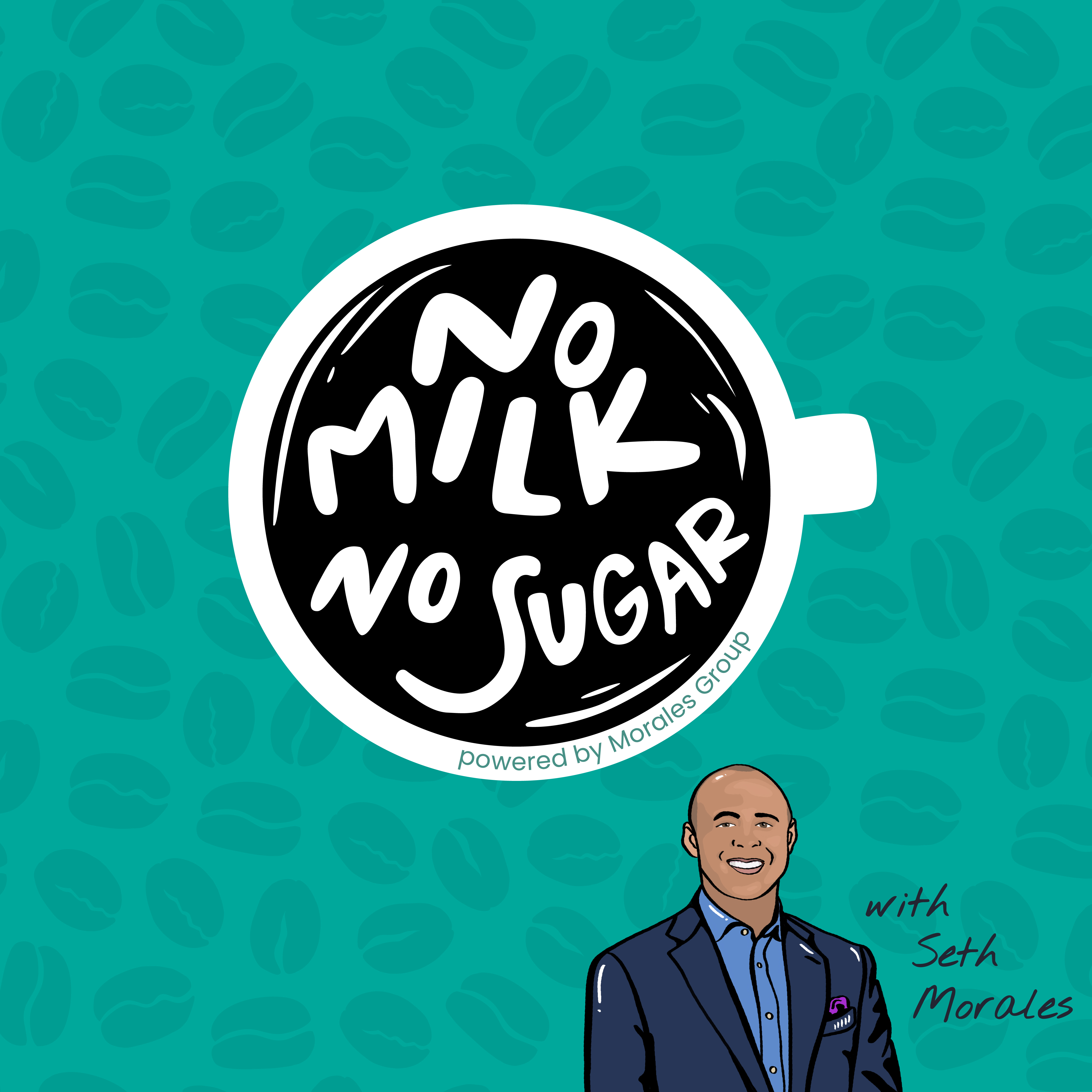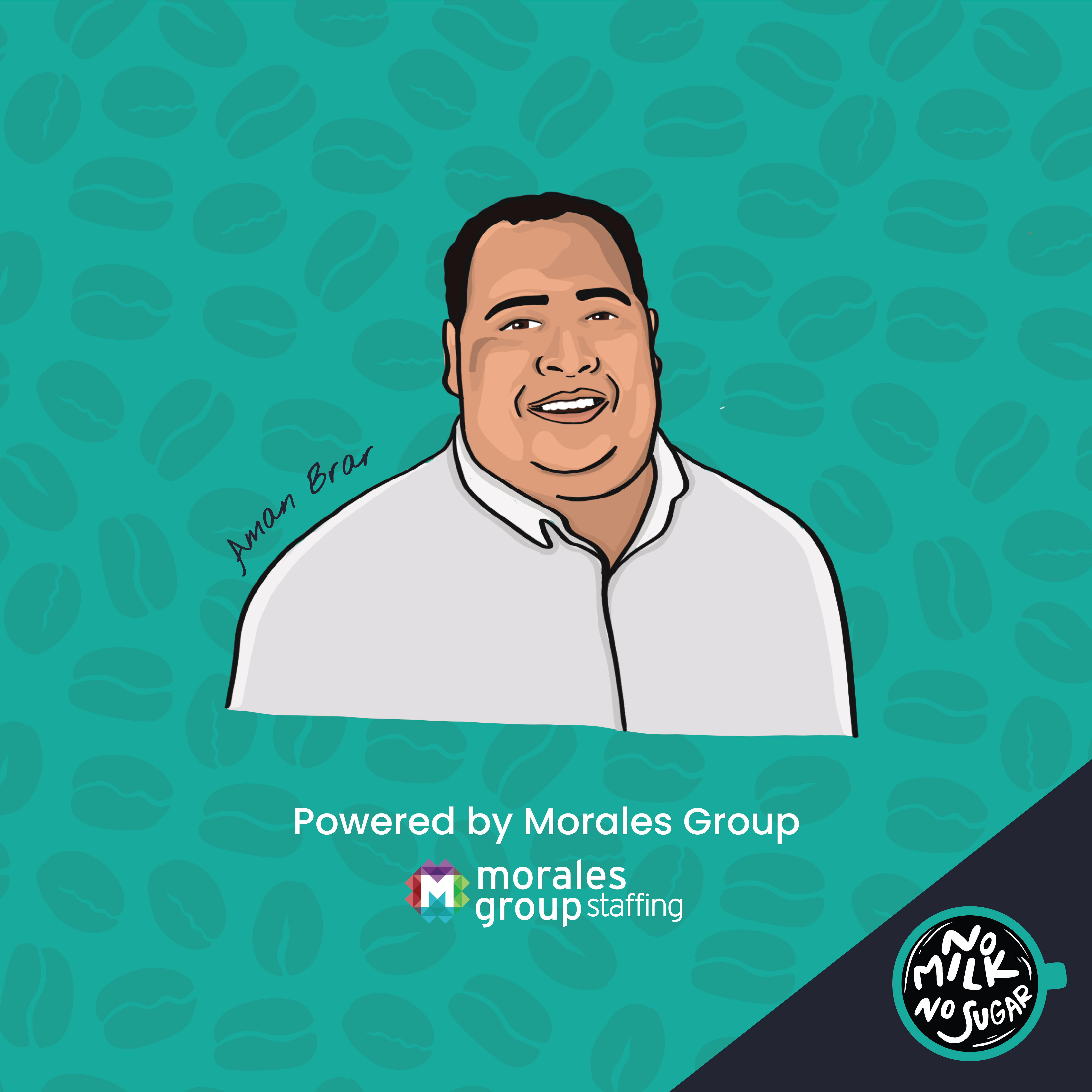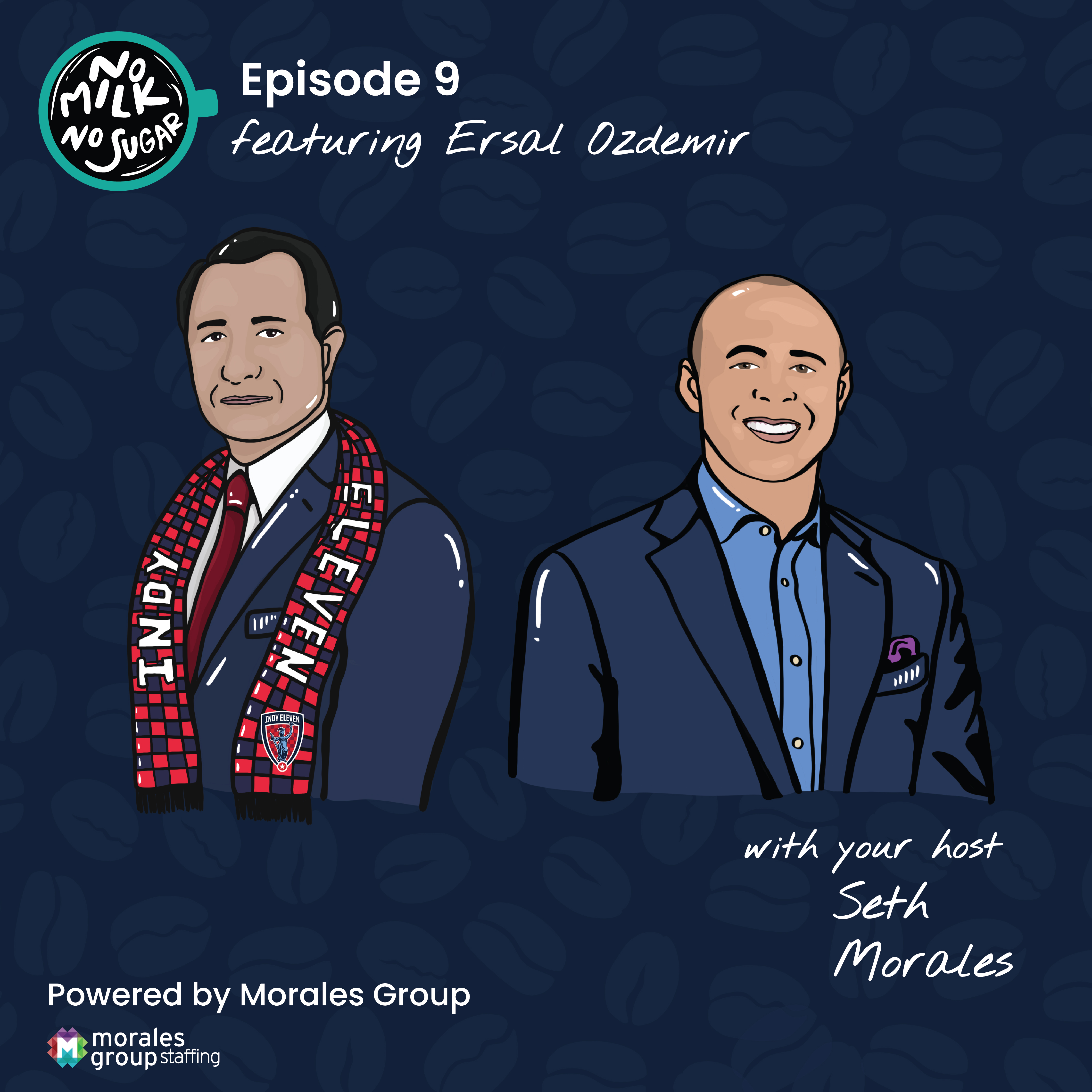The Transformative Normal, with Indy Airport's Mario Rodriguez
- 0.5
- 1
- 1.25
- 1.5
- 1.75
- 2
Tori Updike: A coffee for Seth, no milk, no sugar.
Seth Morales: Right here, thank you.
Tori Updike: You are listening to No Milk No Sugar, the podcast about business beneath the sweetener. Powered by Morales Group and hosted by CEO, Seth Morales, we talk to local movers and shakers about what can be the harsh reality of doing business. We cover what no one likes to advertise but everyone wants to hear. I'm Tori, producer of the show, and today, we talked to Mario Rodriguez, CEO of the Indianapolis Airport and seasoned veteran of leading through a crisis, most notably for his efforts at the New Orleans Airport during Hurricane Katrina. Mario digs into why common good matters over the bottom- line profits, how to apply other cities' successes to Indianapolis, and how to look at any crisis as an opportunity to improve.
Seth Morales: Hey, we're in a coffee shop and we're catching up, and I got a cup of black coffee here, because we're not doing any milk or sugar. It's business beneath the milk and sugar, so this is the raw cup. You've been through a lot, man. I think as a leader... I was reading your bio and listening to some of your podcast. As a leader, leading different airports, going through what you just went through with COVID at the Indianapolis Airport and leading in the past several years back with Katrina and what happened with the New Orleans Airport, you've had a lot of adversity and you've been able to overcome it. Talk to me about just how that shaped your character. What's that done to you as a leader? I mean, Katrina and COVID, I don't know too many airport directors that maybe have been through that much. And there probably are, you probably know of some stories, but... I mean, gosh, that's quite a bit of a track record. So how's that shaped you as a leader?
Mario Rodriguez: It's going to be a little bit counterintuitive, but follow me here. If we are just a summation of our experiences, which is basically tacit knowledge... You have technical knowledge and you have tacit knowledge, and tacit knowledge is created through summation of our experiences. Katrina was good. COVID was good. Not in the sense that we've had... It was a tragedy, both. There were people that died needlessly, that didn't have to die, and it was a incredible human tragedy. And Katrina was localized to New Orleans, and in COVID, it's basically spread all over the world. I'm not reducing the incredible tragedy. As an experience, it builds your experience like nothing else does. So it really is good. So when people say," You know what? I failed at something," it actually is a good thing, and it creates that that sum of experience. And I remember going... When COVID started, everybody's panicking and I'm sitting there going," Well at least we're not living in FEMA trailers and eating MREs. We're going home every day. Look at the bright side. We could get through this." And even going into COVID, we had 400 operating days of reserve. Call it a little bit of panic from Katrina and experience from Katrina that cash usually is king in these sorts of operations. So it has built my foundation of knowledge, and it really is fascinating. When you start looking at how people react and how people of certain intelligence... Let's say you and I play chess. The difference between you and I and a grand master is the amount of games they played. So they're not thinking technically," Hey, look, I'm playing this game and I'm going to move from point A to point B, and this is a technical move." No, they're thinking," I played this game before." So the more knowledge you get, the more games you play, the better apt you are to deal with whatever situation comes up. After Katrina, unless the city floods, we're good. I can handle the situation.
Seth Morales: I think that's a phenomenal comment that you said, shots on goal or being at bat, or getting those experiences. I heard that from Ersal on the podcast. He was talking about how he made a lot of hiring mistakes early on, but he learned along the way, and now he's figured out. So I think that's great that you've gone through those experiences. I heard you the other day on a podcast mention with maybe COVID that it was not necessarily some big, bold decisions, but they were just kind of a lot of small decisions that were trial and error, and you try to tweak and figure a way out. It sounds like those experiences with Katrina and COVID have really kind of helped keep you calm and keep the ship afloat. And obviously, Indy Airport has had a ton of success. You guys have had a lot of accolades, so hats off to you on that front. As we go forward, I'm curious just for our listeners. I mean, we've got the variant picking up. Any quick thoughts on just what's ahead with the next three months? Are you cool and collected? Or what are some thoughts here?
Mario Rodriguez: We're fine, but remember, COVID has been transformative for a lot of industries, our industry included. What we're doing right now, before COVID, I would've had to go into the studio with you. We had this technology, so business has transformed. Call COVID an accelerator. So COVID has accelerated business or the use of business tools, in my opinion, five years in five months. So in other words, it's basically... And it's not going back. So for us, business travel is going to look a little bit different. If you look at the hospitality industry also, which we're part... We have a lot of restaurants, and news, and gift, everything you would associate for business and business travel and personal travel at an airport that you need. That's changed. Everybody's focusing in on one thing." Hey, let's pay people more, and they'll come back." When has throwing money at a problem ever fixed the problem? It'll ameliorate it a little bit, but there's been a transformative sort of thing in the hospitality in industry. So travel in the future, you sitting down in a restaurant, you may be ordering off a tablet, and a runner may be coming to you with your food. Sort of more of a self- serve and self- help sort of option, because the hospitality industry... Everybody fails to understand one thing: Our baby boomer population retired. Generation X, my generation, there's not a lot of us. And the millennials have changed their point of view when it comes to the gig economy, when it comes to the hospitality industry. So there's been a societal shift, accelerated probably by COVID. It's not like Occam's razor, the simplest explanation is the right explanation. In this case, probably a more complicated sort of analysis of the situation. And our hospitality industry will evolve to meet this challenge. Just that everybody's three steps behind right now, and once they catch up, you're going to see things are going to change. You're going to have less waiters, waitresses. Maybe the waitress and waiters as in most restaurants go away and are substituted by runners, for example. Maybe it's a self- serve option with the news and gift. You just pick up your news, sort of like the thing you're do in the grocery store nowadays, that you self- checkout.
Seth Morales: It's fascinating, the shift that's going on. I read an article the other day about the Great Resignation and how a lot of employees are shifting, and talent has options, or they're rethinking what they want to do. As you talked about, maybe the millennials rethinking the gig economy, and especially in the hospitality space. And so it's been disrupted, and I think technology can help, you and I on this call today versus in the studio. I'm on the board for St. Vincent's Health, and I was talking to Jonathan Nalli, who runs St. Vincent's Indiana. He was on the show a few episodes back, and he was just talking about how COVID was this kind of phantom or ghost, and they didn't know what to do. So it was a lot of trial and error, similar to what you mentioned, just kind of trying to figure out how to mitigate it, but telehealth and Teladoc and all the technology has really kind of come to the forefront for them. And so it will be interesting to see how we go forward, but it'll just be kind of a nuanced way.
Mario Rodriguez: Well, we go forward. Look, human beings have this really bad tendency to try to go back to an idealized past that never existed in the first place. They want to go back to normal. They don't realize that time moves on and things like this, things like COVID, worldwide things like... It was an existential threat, so it caused shifts in society. So it caused a change, a rapid change, where otherwise we wouldn't have this change. So people have got to get used to this change. Katrina was the same thing localized, but this has been a nightmarish situation for a lot of people. But human beings want to go back to that idealized that they had in their brain, which never existed in the first place, by the way. They don't understand that it's a transformative normal. It's not even a new normal, it's a transformative normal.
Seth Morales: Well put, man. Being in your seat, leading the airport, leading other airports in the past, what's tough about being in your role, man? If you had like," Hey, this is a tough part. This is being in the hot seat. This is what it looks like."
Mario Rodriguez: Internally... Obviously, there's challenges internal and external, but the internal challenge is the same challenge you have, is to make sure that your organization sees the vision. To put it very simply, everybody looks at a bottom line. Our bottom line is incredibly complex. Why? Because you own this facility, for lack of a better term. But I can't monetize that investment that you have in this facility back to you in cash. The only way I could do it is in a public value equation, give you better parking, a better economy. Concentrate on underpinning what you're trying to do. So that's a difficult concept, so getting everybody aligned is difficult. And also, status quo is the most insidious danger we have in these type of organizations. It's kind of hard, so you have to keep picking at it and changing. Now externally, the challenge is, in most of these organizations, is making everybody understand externally what public value is. And that's been an incredible... Because it's an amorphous term to begin with. Everybody sees a P& L and sees a bottom line and says," Well, you're either making money or you're not making money." Our challenge is we make money, a lot of money, but I can't monetize that investment back to you, so that money has got to be invested in a way that benefits you. So that's where the trick comes in, in economic development and better customer service. So that's where it gets really, really, really, really complicated. So the money that we make, if we don't invest, it's useless, and it doesn't serve you at all.
Seth Morales: Well, you guys have done a great job of pouring it back into the airport, and you know there's a value. You guys have won awards. So you've won how many years in a row? What's the award? And then give me some insight of what... Going forward, what does the airport look like with some highlights?
Mario Rodriguez: Well, so far we've won our association's award for best airport in the United States for 9 years in a row, 10 year in total. We lost one time to Canada, but we don't consider that... We were robbed on that one. We don't consider that one a loss. But nine years in a row, which is a heck of a record. Since I've been here, we've won two J. D. Power Awards, which... The association, our association is very powerful, but you have to explain to people what Airport Councils International is. You don't have to explain to people what the heck J. D. Power is. Everybody inaudible. And to win two J. D. Power Awards is phenomenal. It basically says that... It validates the push for increased public value at the airport, and it validates everything that we're doing.
Seth Morales: It's phenomenal how you guys continue to win those awards. I see your posts on LinkedIn. I'm like," Man, when are these guys going to stop?" It's the win streak, man. You guys are a dynasty. But going forward, talk to me about some highlights or some things that are exciting about what's ahead with the airport amid COVID, post- COVID, new flights coming in, just projects. Give us a flavor there.
Mario Rodriguez: Well, we're getting a big shift, so what you're going to see is more and more ultra- low- cost flights. Right now, we have practically every single ultra- low- cost carrier that flies. So we have Sun Country, Allegiant, Spirit, Frontier. You just have to look at how they're set up, and once people get the rhythm, they're really good airlines. Now, you have to understand that if you're paying$ 49 each way to Florida, you're going to get$ 49 worth of customer service. And if you want a soda, you're going to have to pay for it. And if you want to your bag in the overhead, you're going to have to pay for it. And if the cabin depressurizes and oxygen comes out, you're going to have to pay for that also. If they could charge for that, they would. And that's the a la carte sort of model, but it's the future of aviation, like it or not. The legacy carriers, they call them legacy because they're old. And they don't want to call them old carriers, but they're the old hub- and- spoke model, which has a very, very prominent part right now in the industry, but their market shares decreased. They've got the largest market share, but they're decreasing slowly, and the ultra- low- cost carriers are increasing. So you're going to see a lot of that. You're going to see a lot more economic impact from us. We have, for example, things that you wouldn't know. We are spending$ 170 million on reconstructing a runway, which may not sound... And it's sexy to us, it's not sexy to you. But what is sexy is that most of the people working on that runway are going to be local. So it's going to be local designers, local contractors, local inspectors, which puts$ 170 million into the local economy. Larger drones will carry cargo later on, and eventually people will be carrying drones to the airport, consolidate it on the aircraft, and move to different locations around the globe. So that is the future of aviation. The future of aviation is that integration of drones beyond visuals, line of sight, into the airspace, and that's what we're looking at right now. And there's a lot of things going on. Customer service, we're improving. We're coming up with ideas for improving customer service, i. e., more technology. So in other words, once you're walking down the concourse... We're going to see if it works. You're going to have QR codes down the concourse. You can take a picture of it, and it'll give you sort of like a Zoom call with our customer service, just in case inaudible. So you don't have to go to customer service, and that'll work out. And we're participating... For the longest time, ever since I got here, I've been concentrating on equity and diversity. We established a diversity officer a long time ago, and she's got a team. And just in 2019, we were outside spend, basically procurement spend, everything from contractors to books to rubber bands, whatever. Our spend was 40% to diverse companies. Women, minorities, and veteran- owned companies, 40% of every dollar went to them. And we spend hundreds of millions of dollars on construction and equipment and stuff like that every year, so that was quite a feat. And internally, we've developed a pipeline to train and bring up to the executive level folks that wouldn't otherwise be there, to such a degree that we developed basically an educational funding program, and we're able to fund up to the IRS max. In other words, we're able to fund anybody's education. So anybody that comes here and wants to study, a bachelor's or master's, we'll fund them, no strings attached. Well, think about it. Your eyes lit up, but think about it, think about what we're trying to do. We're trying to increase public value back to you. So if I'm able to take someone that otherwise would not have studied and give them a leg up... Wouldn't have studied because of various reasons, monetary being the principal one, and they're able to work here at either a technical or a professional education, and they stay here, it's positive for the authority. If they leave and stay in Central Indiana, it's a positive for Central Indiana. And we still add public value to the entire Central Indiana area. And they may come work for you, they may come work for somebody else. So we're basically monetizing, to some degree, the investment you have in this place.
Seth Morales: Yeah, I love it. You guys are definitely, from a leadership standpoint, not status quo here, and whether it's the runway project, the technology with the QR codes, or the transformation on just investing in your people.
Mario Rodriguez: There are tech companies, local tech companies that are using this airport as their first platform. So we're allowing them to come in, we're buying their services. If it works, fine, and they can sell it at other airports. If it doesn't, they've at least used us as a beta test. Part of my job, and this might sound weird, is to be parochial. You want to keep the economic impact of this place here. I don't want to ship it someplace else.
Seth Morales: Yeah, no. I love the local play, man, and you're a good steward of that, it sounds like. All the things that are going on, keep that mojo going. So we were talking a little bit forward in the future with the airport. Just kind of a little bit of context, and looking back... Your track record, you got an interesting story, your parents and... Can you give us a little bit about that story, a little bit about your education? I know education's important in your family. And just some thoughts of how you got to maybe leading us up to the Indianapolis leadership role, but just give us some flavor there.
Mario Rodriguez: Two of my greatest mentors, and they passed away, were my parents. And my mom was part of, basically, an incredible shift in Cuba. It went from a dictatorship... And they were a group. And I should caveat that by saying Mom studied with Fidel Castro at the same time. They were colleagues, and they were trying to shift the government from a dictatorship into a social democracy. Obviously, it went way, way, way, way, way more to the left than anybody really wanted it to. So Mom was part of the first government, which lasted for about 11 months. So Castro set up a government, cabinet president. She was one of the cabinet- level members. And at about 11- month period, everything sort of started going sideways, and she resigned, and everybody else resigned, including the president. The president resigned first, and she was accused, interestingly enough, of anti- revolutionary acts. Note to self: Do not resign in a communist government unless you leave the country first. So she's in the country, and she had to be smuggled out of the country by the Catholic church with documentation saying she was a nun. So she ends up in New York, and remember the Cuban diaspora. Cubans, the first ones, never thought they were going to stay in the United States, or wherever they were. It was just like," Hey, let's leave and hang out where we're at for a little bit until this problem resolves itself," which it normally did. So she goes to New York. My dad was owner... He owned a lot of businesses. The businesses were taken over by the government. So he decided," I'm going to go to Spain." So he hops on a ship, and at that point, I guess it was a part cargo ship and part cruise ship, or part passenger ship. They don't exist anymore. So it docked in New York, and I guess you could do stuff like that back then. He just got off, because he had no long- term vision of staying anywhere, but going back to Cuba. So that's where my mom and dad met. And to make an incredibly long story very short, we moved to Miami. And one of the advantages I have, which I finally realized it was an advantage, I thought it was a disadvantage, is that we grew up poor. So it gives me a different perspective and a different angle on how I'm seeing things, but I grew up with very educated parents that valued education. So I ended up studying engineering, and what's interesting... My mom graduated... Because law in Cuba is Napoleonic law, for lack of a better term. Over here, it's British common law. So she graduated law school the same year I graduated engineering school again. So they finally got it in their heads that... It took a long time. Cubans are really hard- headed. It took them a long time to figure out," Oh, crap, we're not going back. We've got to set up our lives here." So she went back to law school, and I graduated engineering school the same year she graduated law school again. So it was rather interesting, and then I started working... I have three decades in aviation. I started working in different airports, Fort Lauderdale. Got the privilege of designing part of the Hong Kong Airport, lived in Kuwait for a little bit, Houston, New Orleans, Long Beach, California. So I've been all over the world.
Seth Morales: Yeah. My head goes," Man, this is a treasured asset." You're a talent, man. Don't want to lose you to the next big opportunity.
Mario Rodriguez: Oh, no, no, no. This is the finest place I've ever lived, for a very simple reason: Everybody living here are the nicest people, genuinely nicest people I've ever met. It is a wonderful place. My wife, who is way smarter than I am... By way, she's an aeronautical engineer and she owns her own company. We love living here. It's wonderful people. The weather could be nicer, but it's a wonderful place to live. Everybody collaborates. We're really enjoying ourselves. And over the years here, I've gotten offers. As a matter of fact... It was rather interesting. My people freaked out because before COVID, Garcetti, Mayor Garcetti of LA, flew in to see me to try to convince me to go to LAX. And he was sitting in my office. We're having lunch. My people are walking around going," Is that Eric Garcetti?" Yeah. I kind of ticked the boxes. And what's positive for me and what's good for the industry at large is that there's very little diversity. So we could move the needle on diversity in this industry and open up career paths for people that are diverse, which otherwise they didn't know about in the past. And there's probably three Hispanics running airports in the United States of crosstalk, that are large- sized, and there's probably half a dozen African Americans. So there's very little diversity. Our industry was very well White, male- dominated. As a matter of fact, every single airline that's ever existed in the United States that's still operational or defunct, there's only been one woman CEO, and one Hispanic CEO. That's it. So there's an ability to move the needle on that.
Seth Morales: Yeah, it sounds like it. Well, I'm glad you're here, man. I was curious, just a quick question, best and worst maybe reputation with airports. If you were to say globally, domestically... Who's got a great reputation? Who doesn't have maybe the best reputation today?
Mario Rodriguez: Internally, for the people that... I'll give you both. For the people that actually know the industry, Indianapolis has the best. Probably, I would say, it's a toss- up between LaGuardia and maybe New York as freaking horrific. Now, also Miami is very difficult, because it's such a large beast and there's so many moving parts, and LAX is the same way. But when it comes to incredible difficulty, it's the Port Authority of New York and New Jersey. Because your job as the CEO is dependent on two governors and a mayor, which at any given time have competing interest. You got two governors and a mayor, and the mayor of one of the most financially powerful cities on the face of the planet, and two governors of pretty sizable states and populations. And it's basically making sure to some degree that... You make sure that they don't kill each other and that the airplanes keep flying. So the best you could hope for is hold on for the ride. That's probably the best you could hope for. You can't move the needle on that. Now, when it comes to the outside point of view, you're also looking... In the United States, it's different. Let's look at worldwide. You remember when I was telling you about public value? Everybody has a different set of value for their investment. I think some of the best airports in the world are in the Middle East, because Qatar, for example, Qatar is not interested in a returns for their investment. They're interested in being part of the world, and being viewed as part of the world. So Qatar Air is probably one of the finest airlines in the world, and they're giving you more than you're paying for, but they want you to make sure that you understand that they're part of the world. So when you land in their airport, which is brand new, and it could handle 95 million passengers, and it's probably doing 20 right now, you're looking at a magnificent thing with different fountains, and it's beautiful. So what they're trying to make sure is they're trying to impress you, and that they're part of the world. They've got oil money. In this country, I think there's probably 300,000, 400, 000 people from Qatar. That's it. So it's less than the city of Indianapolis, and they're trying to impress the world. Singapore is very impressive. Now, horrible, and I've been here, is Port- au- Prince, Haiti. That's probably the single most scariest freaking airport I've ever had the unfortunate privilege to land in. The runways are short, the terminal was scary. There was only one air conditioned room in the entire terminal. It was the VIP lounge. And it really is a poor... Nice people, by the way. Nice people, great focus on customer service, but they just didn't have the money or tools to create what they needed to.
Seth Morales: That makes sense. Those are good perspective inaudible when you've got that inside knowledge and just curious personally on what's a good airport. And I can't imagine being the leader of LaGuardia and just managing all those different constituents and leaders. It's crazy.
Mario Rodriguez: Oh, yeah. And managing competing interests, and making sure that... Honestly, the Port Authority of New York and New Jersey is probably the single biggest disaster in our industry.
Seth Morales: Well, kind of getting back more to the CEO seat and business overall, this podcast is No Milk No Sugar. It's all about business beneath the sweetener, and just being real. What's one thing, Mario, where you've had a mishap? You made a mistake, something that you regret. You look back... We know we're not all perfect, but one thing that really maybe helps shape you as a leader that maybe you made a mistake, and you've learned from, what comes to mind?
Mario Rodriguez: I've gotten to the point in my life where I don't regret anything, because I've learned through it. But I think for the longest time, at least during the beginning of my career, I was focused on the wrong metric. I was focused on generating a lot of cash, and making sure that my profit and loss statement looked good. So the airports that I worked at had an enormous amount of money, but that money wasn't reinvested. So it was basically looking at trying to corporatize something that's in the public sector. And I slowly adjusted my point of view and started looking philosophically at what public value is, or what value is in general. And in a corporation, you have to make profit, because you have shareholders, you have ownership, and you have to make your bottom line. In our organizations over here, since it's public ownership, what we have to do is we have to increase the public value of it. And just stacking money on top of money doesn't work, because you can't monetize that back to Seth Morales, for example. But you could monetize very reasonable parking rates. You could monetize good customer service. You can monetize economic impacts, so on and so forth, but those are amorphous terms, and it's very difficult for people to get their heads around. But early on in my career, I focused on the wrong things.
Seth Morales: You started off the conversation talking about public value, and you could tell that that was an important emphasis for you. It's interesting how you went through that shift. I think I've done a little bit of that myself. We are privately held, and you got to run and operate and give back to the shareholders, but at the end of the day, this idea of philosophical public value and... It's really about the greater good. And how can we invest back into the airport to make it a better experience overall for the city? I love that mindset, man, so it's refreshing to hear that from one of our best leaders in the city. We've got a couple minutes left, man. Anything you wanted to touch on, or anything that you wanted to share with our listeners about you as a leader, the airport? Or we can wrap up too, if you don't have any other final thoughts.
Mario Rodriguez: I want to make sure that everybody understands that we have a great team here. I think the team itself is great as a team. Individually, we have all our frailties and negatives, but we all have enough positives to counterbalance everybody's negative. So we have a great team, and that's why this airport will continue to deliver public value. And really, the main focus to us is not about making the airport better, it's about making the community better. So leveraging our assets to make everybody's life a little bit better, making our people better educated, better trained, having them live a better life. We even have to the point that we have... Right now, we've been focusing in on health. We have a gym at the airport with trainers to help our people. Obviously, the byproduct is since we're self- insured in our health insurance, our health insurance actually benefits from that. But we didn't do it because of that, we did it because our people need to live a better life, and thus they take care of the customers a lot better. So it's just some examples of what we're focusing in on.
Seth Morales: Well, I appreciate you, man, sharing. It's been an honor to have you on the show, man. You're doing phenomenal things. You've had a great track record. I think we're fortunate to have you as a leader. Need to keep you in that spot and keep building up Indy, and just want to say thank you for joining us today.
Mario Rodriguez: It's an honor to be here at Indy with all of you. I consider myself very lucky to have landed here. It's been the best decision of my career.
Seth Morales: All right, we're talking to Mario Rodriguez. He chopped it up on the show with us today. Had a great time. I think there were some good takeaways. He had talked about a few things. One thing that he talked about was just early on, he focused on his P& L, and later he realized: Hey, it's not about the bottom- line profit. It's more about how do you just give value back to the public. They run the Indianapolis Airport. He's thinking about not only the airport and his team, but the overall city of Indy, and I love that he's just kind of got that mindset for the overall common good. So I think that was a good kind of learning or takeaway. It's not all about the bottom- line profit. You do have to run a well- run business that generates some funds, but at the back end, I like that. I thought that was a good sticky takeaway. And it sounded like it was a good learning for him over the years.
Tori Updike: I also think it's interesting that I think we have seen kind of this theme or trend amongst the leaders that we talk to, where a lot of the forward thinkers that we talk to are definitely looking at what is working in other areas, and taking that experience and trying to apply it to Indy. And it'll be interesting to see how that kind of shapes the city in the future.
Seth Morales: Yeah, a lot of cool projects on the forefront. The aviation industry is being disrupted, the airport itself having to adjust with COVID. So that was really fascinating. I think Mario's experience going through Katrina down in New Orleans, and then running the Indy airport with COVID, he's learned to just kind of maneuver with quick, small decisions, and not be afraid to make some mistakes. I think he said... What'd he say? He said those learning experiences from Katrina kind of kept him calm and cool from COVID. And so I think the more shots on goal, we were talking about, the better you feel or the more confident you are. And so that's just, I think, a good learning for any leader. You just need to be at the plate taking some swings.
Tori Updike: I think that's also a theme that we see in the people that we talk to. I remember Kristin, Kristin Mays- Corbitt, talking in episode six about how it's best to view any crisis as an opportunity to improve, and I think that Mario really embodies that as well. He mentioned how people have this tendency to want to go back to this idolized past that didn't really exist in the first place, and how... While COVID is obviously an unimaginable tragedy, it also showed a lot of the things that weren't working that we needed to fix and innovate.
Seth Morales: Yeah. That's a fantastic point, and I think you got to lean into that. And there's so many people that want to kind of retrench and go back, and it's like,"Man, you got to be progressive- minded. You got to lean into..." The train has left. We're not going back to 2018, 2019. That that ship has sailed.
Tori Updike: And really, when has that ever happened in history? We always continue to move forward.
Seth Morales: It was fascinating to hear that, and then hear how he's recruited from Long Beach to Indy. And it was more about the opportunity to help build this new airport up, and how this recruiter reached out to him. So cool insights, just kind of geeked out on that. I thought that was fun, just hearing from him on just what... Behind the scenes with the Indianapolis Airport, what's it all about.
Tori Updike: I mean, that is fascinating, because I know that I'm biased, but I always have really loved the Indianapolis Airport. I mean, it's beautiful, it's spacious. Just the energy there feels very nice. It is a nice place to sit and wait for kind of your next adventure that you're going off on, and it's a nice place to come home to. It's very easy to navigate. But I do remember when I was a kid... I didn't go on that many trips as a child, but I went on one, and I remember how the old Indianapolis Airport was, and it was not nice. It was not what I would call a jewel, and I definitely like our airport now much better.
Seth Morales: Yeah, we definitely upgraded. It's like when you come home from a trip and you come to the Indy Airport, you're like," Okay, this is clean, it's new, and it's well- run," and you feel a sense of pride.
Tori Updike: Thanks for tuning into another episode of No Milk No Sugar, the podcast about business beneath the sweetener. We hope you learned something, and we'd love to hear from you. Tag us with# nomilknosugar, or email us at nomilknosugarpod @ gmail. com, or connect with Seth on LinkedIn. Subscribe wherever you get your podcasts, and we'll see you next time.
DESCRIPTION
We talk to Mario Rodriguez, CEO of the Indianapolis Airport and seasoned veteran of leading through a crisis — notably for his efforts at the New Orleans airport during Hurricane Katrina and guiding Indy through COVID. Mario digs into why common good matters over the bottom line profits, how to bring other cities’s success to Indy, and how to look at any crisis as an opportunity to improve.
Today's Host
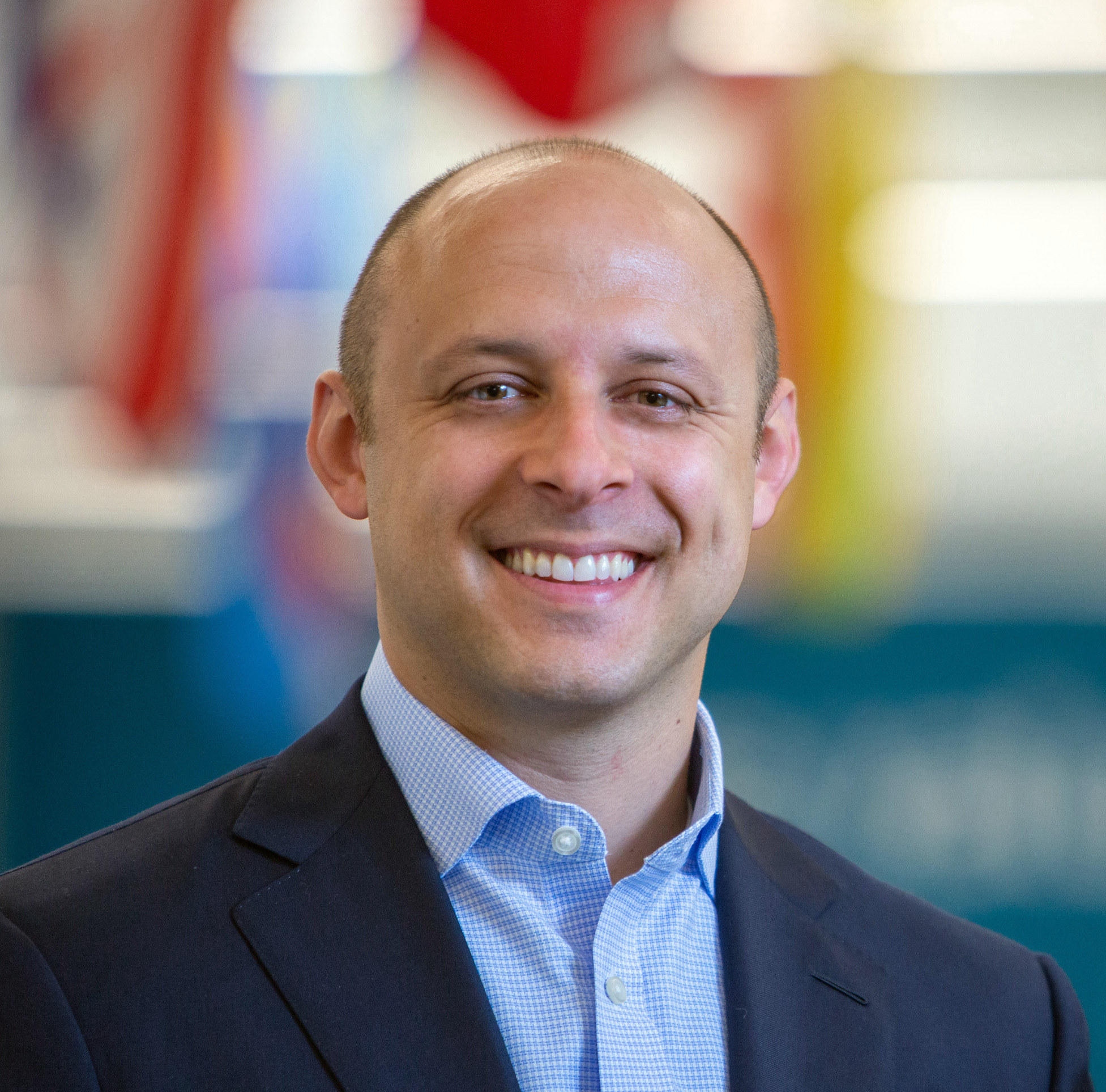
Seth Morales
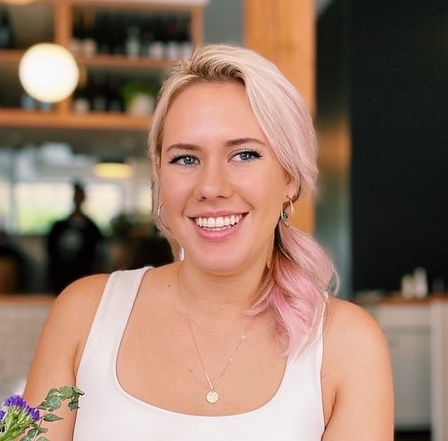
Tori Updike
Today's Guests
